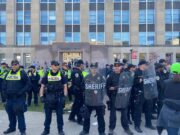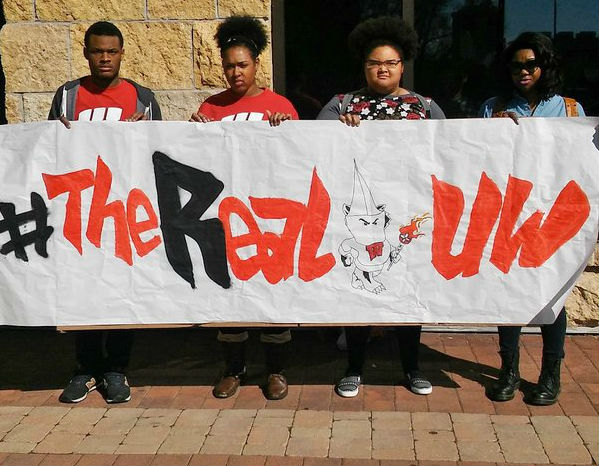First-year UW student and Sellery Hall resident Launa Owens was the victim of the hate speech that prompted a strong and emotional response from Vice Provost Patrick Sims, Madison365 has learned.
Owens believes the note, which contained the words “You F— w/ Bucky, you f— with us,” was in response to a photo of Owens and three friends at a protest holding a sign that depicted Bucky Bager in a Ku Klux Klan robe. They held the protest at Hillary Clinton’s campus rally Tuesday, not to protest Clinton but to raise awareness of racism on campus.
“It was not a protest to Clinton, it was just a protest to the university,” Owens said, adding that the photo was widely circulated on social media. “Just because there would be a lot of people there, the media would be there.”
Owens also believes the note contains a threat. The bottom of the note shows four vertical lines with one crossed out, possibly representing the four people in the photo.
Owens, a violinist who studied orchestral music at Milwaukee School of the Arts and hopes to become a social worker, said she found the note when she awoke around 9:45 am on Thursday.
“I picked it up and read it and at first I didn’t think too much of it. It was just like a punk move to me,” Owens said in an interview Friday. “I had a class to go to. I’m in my class, I’m thinking more about it, I can’t help thinking about it.” She said that’s when she started thinking about the other people in the photo.
 “The four lines at the bottom, maybe that means something,” she said. She said she alerted the other people in the photo, then spoke with the Sellery Hall Resident Life Coordinator and filed a report with the Dean of Student’s office through the online Hate and Bias Reporting system.
“The four lines at the bottom, maybe that means something,” she said. She said she alerted the other people in the photo, then spoke with the Sellery Hall Resident Life Coordinator and filed a report with the Dean of Student’s office through the online Hate and Bias Reporting system.
She plans to file a police report tonight.
University Communications spokesperson Meredith McGlone said in an email that an investigation is ongoing. Owens said the administration has not reached out to her, except for an email from the hate and bias reporting office offering to meet to discuss the incident. She has spoken again with her Resident Life Coordinator, as well as PEOPLE Program officials and a past PEOPLE Program president.
“(Chancellor) Rebecca Blank, (Dean of Students) Lori Berquam, Patrick Sims, none of them have have reached out to me,” Owens said. “I’m not sure what (investigation) could be ongoing.”
McGlone said the administration won’t discuss details of specific investigations, but said, “there is an investigation. The investigation began immediately when the student reported it to housing and the investigation continues today.”
Speaking generally about investigations of hate and bias incidents in residence halls, McGlone said, “the very first thing that happens is that housing responds. That is the immediate response that is given to students any time anything is reported. In addition, then, housing reaches out to other units on campus. The purposes of those contacts are both for support and investigation. They are not only asking, what support do you need, they are also gathering as much information as they can.”
McGlone said campus administration is careful not to overwhelm students who’ve been victimized with contact from too many different people, many of whom they may not have a relationship with. “The last thing we want to do is cause more trauma to someone who has been through something very, very difficult,” she said.
Owens isn’t buying that explanation. “I feel as if it is bull,” she said.
Owens said she lives on The Studio floor of Sellery Hall, which houses a higher-than-usual percentage of students of color through the PEOPLE program, First WAVE and other scholarship programs. Even though whoever left the note knows where she lives, she’s going to stand her ground.
“I don’t want to move,” she said.” I do have a support system on our floor. I’m from the hood. I’m not going to be physically attacked. I did a lot of weight lifting in high school.”
She is more worried about being provoked into doing something she might regret.
“My parents don’t have money to get a lawyer. I’m here on a scholarship, I could lose my scholarship” if she gets into a racially-charged fight, she said.
Owens said she appreciated the tone and tenor of Sims’ video response.
“I appreciate that he didn’t send out what Rebecca Blank’s been doing, letters or a tweet,” Owens said. “I did find some things he said in the video kind of problematic. I’m no one’s sweety,” she added, referring to one of Sims’ comments in the video.
Owens said this isn’t the first racist incident she’s been part of since arriving last fall. She said she’s experienced many microaggressions and general racist attitudes, and in one incident she and some friend had beer cans and beer bottles thrown at them and were called the n-word and “monkey.”
She said she’s frustrated that the administration doesn’t do more to combat racism on campus.
“There’s not any actions,” she said. “There’s not harsh consequences for people who perpetrate racism on this campus. People are getting bullied. Lord knows what could have happened to those people in the photo.”
The administration might be getting the message, though, and is standing behind Sims’ stronger-than-usual response.
“He has strong support from the rest of campus leadership – not just in this latest message but in his division’s ongoing efforts on this issue,” Mcglone said.
The university posted the video on its own website along with a statement, which reads in part, “UW-Madison is committed to fostering a campus environment where every student feels valued and able to thrive. We encourage students, faculty and staff to get involved. To voice your support, use the hashtag #enoughisenoughuw.”
McGlone said she hopes this and other incidents can help more students come forward to report incidents through the Hate and Bias Reporting system, and to understand the process that unfolds after that.
“As difficult as these situations are, we hope that one good thing that could come out if it is greater awareness of the reporting process, and that we do investigate and that we do hold people accountable when they violate campus policies,” she said.
Owens challenged her fellow students and citizens to speak up and do their part to curb racism.
“Especially in a classroom setting, if you’re around your friends or your family, if you hear something that doesn’t sit well with you, even if it’s from your best friend or your great-grandma, say something,” she said. “Be uncomfortable, because I’m uncomfortable at this university.”
And to the perpetrators, Owens would like to issue an invitation to come out in the open.
“Stop hiding behind anonymous notes, anonymous Facebook pages,” she said. “Come out and say something and I’ll school you afterward. Stop hiding.”
This story was updated to include more details on hate and bias investigations provided by Meredith McGlone.




























